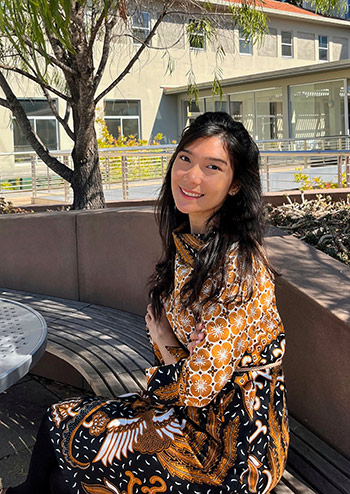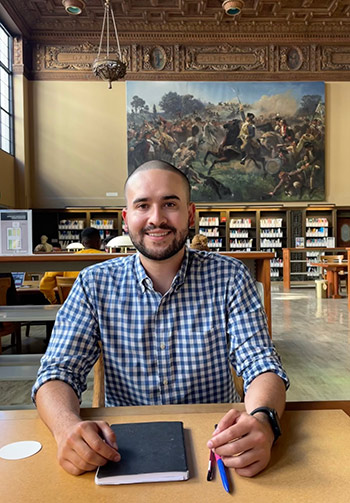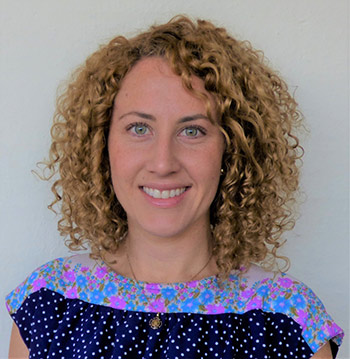By Marissa Guitierrez
This fall, 246 students from 41 countries enrolled in Berkeley Law’s LL.M. Program, bringing a vast array of experiences and perspectives from across the globe that greatly enrich the school community.
Designed to prepare foreign lawyers for global practice, the degree provides a strong foundation in the fundamentals of U.S. law while also allowing for customization based on individual interests. Students can earn certificates of specialization in several areas of law, pursue eligibility to register for a U.S. bar exam, and complete a thesis.
While this new class is part of the traditional and thesis tracks, where students earn their degree over the course of an academic year, the LL.M. Program also offers two options in its executive track.
Here’s a look at three members of the talented new class.
A cleaner future

For Elizabeth Simanjuntak, environmental justice has long stood at the forefront of her mind. After moving to a highly polluted city in Indonesia, she remembers being affected by issues surrounding energy and clean technology at a young age.
“I witnessed my hometown suffer from an urgent energy deficit situation,” she says. “My father made me understand that studying law, specifically related to energy and environmental law, could enable me to improve our hometown’s energy management and deployment, and hopefully for the rest of my home country.”
Recognizing education as a privilege, Simanjuntak challenged herself to excel in her studies and experience. Now the President’s Legal Analyst for Energy and Environmental Law at the Ministry of State Secretariat of the Republic of Indonesia, she has helped analyze and draft laws while guiding energy policy in a way that reflects her country’s shift towards a cleaner future.
“Choosing a career path to work with the government has enabled me to expand my contribution and involvement directly in formulating Indonesia’s energy law, regulation, and policy,” she says.
One project that especially resonated was working with her ministry’s intergovernmental team on numerous renewable energy-related bill and legislation drafts. Having deepened her passion for energy law through these contributions, she realized that pursuing her LL.M. in the United States would provide invaluable knowledge in renewable energy.
Simanjuntak says she knew Berkeley Law was the right fit because of its vast community of thought leaders who share a similar passion for energy law, a field she notes is underdeveloped in her home country. Now pursuing a certificate in Energy and Clean Technology, she hopes to advance her knowledge base with an interdisciplinary approach — one she can bring back to Indonesia to propel evidence-based regulatory arrangements and innovation that solve issues hindering her country from optimizing its energy resources.
“As I will return to Indonesia and continue working for the government, I’ll demonstrate this advanced knowledge through my involvement in the intergovernmental team,” Simanjuntak says. “It will enable me to deliver more profound legal advice and consultation to other ministries on current issues, such as energy tax incentives, pricing schemes, low-carbon policies, and sustainable energy initiatives.”
Seeking social transformation

Growing up in Colombia, David Garzón García had two strong factors driving his interest in law.
“The first is my mother. She’s an empowered woman who has fought in her own way against gender oppression, making me very sensitive to injustice patterns,” he says. “The second one, related to my sexual orientation as a gay cisgender man, allowed me to witness how normalizing hate discourses sometimes work through legal and social devices to punish and nullify diversity. In this context, I realized that there were people committed to transforming these oppressive structures, and one of the tools they used was the law.”
Through his steadfast commitment to working in social justice, Garzón-García has already made positive impacts on his community as chief of staff for Colombia Senator Jorge Londoño. With prime opportunities in that position to explore his interests in administrative and constitutional law, Garzón-García felt drawn to Berkeley Law because of its commitment to social and environmental justice. Now, he relishes having a space where he can gain new insights and broaden his perspective.
“I’m very interested in the political moment the United States is going through regarding fundamental rights,” Garzón-García says. “I believe that challenging times serve as catalysts for social movements to find new ways and strategies to defend people’s rights. I wanted to study in a place with a strong position… of respect for and unwavering defense of the rights of disadvantaged groups.”
Currently, Garzón-García is pursuing a certificate of specialization in Public Interest and Social Justice Law to complement his work in Colombia. But since joining Berkeley Law, he has discovered a newfound passion for environmental law, which he also plans to specialize in.
“For me, the law is a narrative that pursues specific goals and values oriented to materialize people’s welfare and achieve social and environmental justice,” Garzón-García says. “I believe that my academic and professional experience will allow me to participate and contribute to that common narrative in a better way.
“My goal and greatest privilege would be to serve as a judge in Colombia and one day eventually become a justice of the Constitutional Court. I firmly believe in an administration of justice committed to fundamental rights and capable of contributing to the social transformation from its institutional role.”
When the time is right

“The U.S. is home to some of the best universities in the world,” says LL.M. student Anneke Bossard. “Deciding where to go is always a difficult decision. In the end though, my decision to enroll at Berkeley was easy… I feel fortunate to be here.”
Bossard was originally offered admission to Berkeley Law’s LL.M. Program five years ago. But nearing the end of a clerkship, she had just been offered a job as a junior public defender in the remote outback of Australia, and the timing wasn’t right.
“I had limited experience working in the trenches of the justice system and a limited understanding of the stark disadvantage that permeates the Indigenous criminal justice space in Australia,” Bossard says. “I knew that a deeper understanding of these issues would inform my post-graduate studies. So instead of pursuing an LL.M., I moved to the outback to work for an indigent defense service dedicated to advocating for some of the most incarcerated people in the world, Indigenous Australians.”
Her initial spark for fighting injustice comes from personal experience. Bossard didn’t grow up wanting to be a lawyer, but ultimately pursued that path after watching the justice system fail someone close to her.
Bossard began her career as a clerk for the chief justice of the Supreme Court of the Australian Capital Territory. Initially, she thought she would become a civil litigation lawyer, but eventually pivoted to criminal law.
“Criminal law is this incredible intersection of human frailty, complex legal issues, advocacy, and litigation. And as a public defender, which is the area of criminal law I ultimately pursued, it’s an incredible opportunity to hold the police and powers that be to account,” she says. “During my first law degree, I only skimmed the surface of issues that intersect with or underpin the criminal justice system as we know it: critical race studies, gender and sexuality, and the colonial legacy. For a long time, I have wanted to dive deeper into those issues. That’s why I’m pursuing an LL.M. degree at Berkeley.”
Citing Berkeley Law’s strong criminal justice program and reputation as a top public university, Bossard saw the school as the ideal place to continue her education.
“It’s time to step outside and gain a new perspective on problems that both the U.S. and Australia face: mass incarceration, police violence, entrenched systemic racism, and a broken justice system,” she says. “My enhanced knowledge of the U.S. civil rights experience will help me develop strategies and legal and policy arguments to better advocate for indigent clients. It will also provide a valuable comparative perspective on the common challenges that face disadvantaged communities in both the U.S. and Australia.”